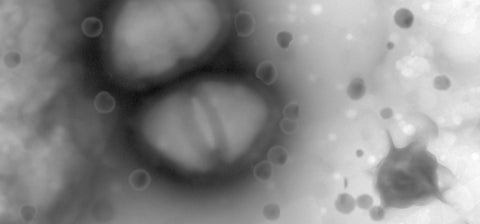
New weapons in the battle against antibiotic resistant bacteria
Two MSRA cells surrounded by solid lipid nanoparticles designed to target MSRA specifically. The particles are used to deliver a deadly biocide as part of a new therapy developed by Waterloo Professor Emmanuel Ho and colleagues at the University of Manitoba that can kill antibiotic resistant pathogens. Scientists have developed a new therapy to combat deadly bacteria that is infecting hospital patients worldwide.
Scientists have developed a new therapy to combat deadly bacteria that is infecting hospital patients worldwide.
The new therapy—a biocide that is able to target antibiotic-defiant bacteria such as Methicillin-resistant Staphylococcus aureus (MRSA)—was developed by scientists at the University of Waterloo and University of Manitoba. The idea here, the researchers say, was to circumvent the superbug’s defences using an entirely new approach based on material science.
We wanted to be able to help vulnerable patients suffering from chronic infections. Once they’re infected with a resistant strain of bacteria it’s very difficult to get them well again.
This latest development provides hope in an age where bacteria are becoming resistant to antibiotics faster than researchers can develop new ones. The World Health Organization estimates 700,000 people die annually from antibiotic-resistant infections and they expect this toll to climb to 10 million by 2050, higher than the current death rate from cancer.
University of Manitoba researcher Song Liu created a potent biocide that kills all bacterial cells - even the antibiotic-resistant ones - that it comes in contact with. The biocide was limited to surface wounds due to its poor selectivity between bacterial and mammalian cells, but if they could deliver the biocide to a target inside the body, it would kill even the most resistant superbug.
Complementing Liu’s work, Ho encased the biocide in solid-lipid nanoparticles (SLN) and then added an antibody, a protein that would seek out MRSA bacteria over other cells. Much like a Trojan Horse, when the SLNs reach the bacteria, they release the biocide, killing the target but leaving healthy cells unaffected.
The results from our initial experiments are very promising. Still, we have a lot of work to do before this is available as an alternative to antibiotics. Our next step is to find out whether the biocide gets released outside or inside the cell.
The researchers say bacterial resistance is unlikely to develop with their SLN particles because the antibodies that are being used to target MSRA won’t cause the bacteria to develop an enzyme or other defence mechanisms in response.
The article appeared recently in the journal Nanomedicine: Nanotechnology, Biology, and Medicine.